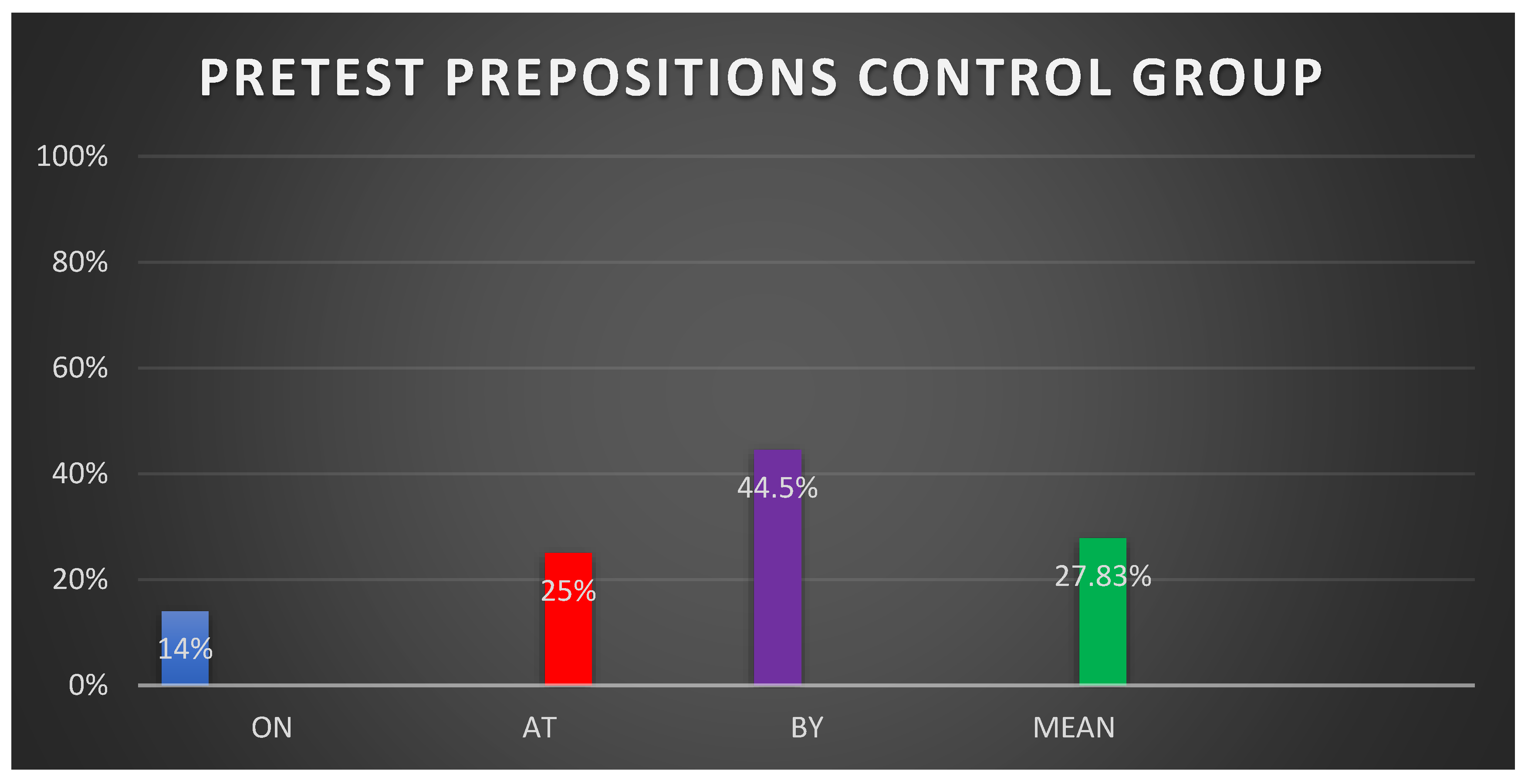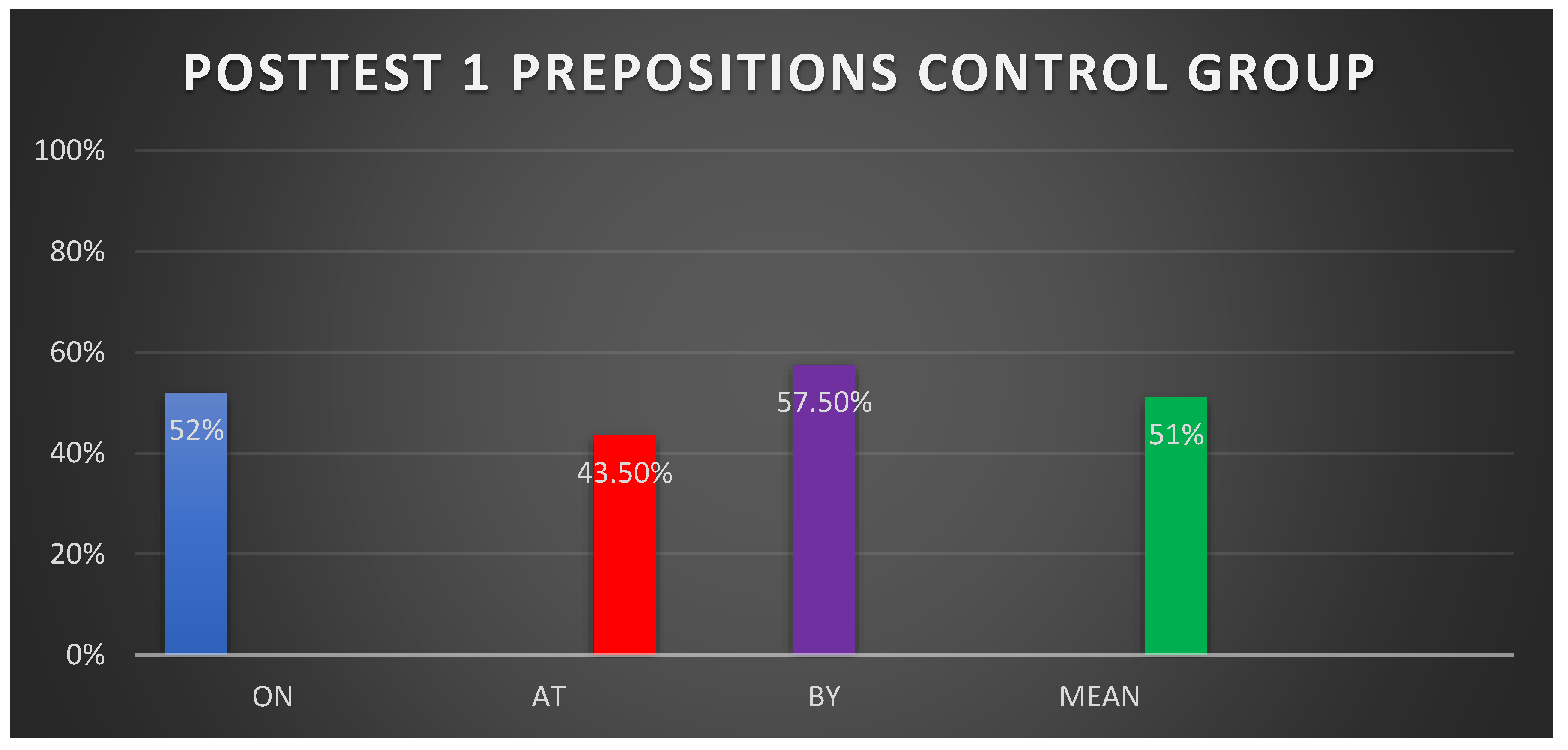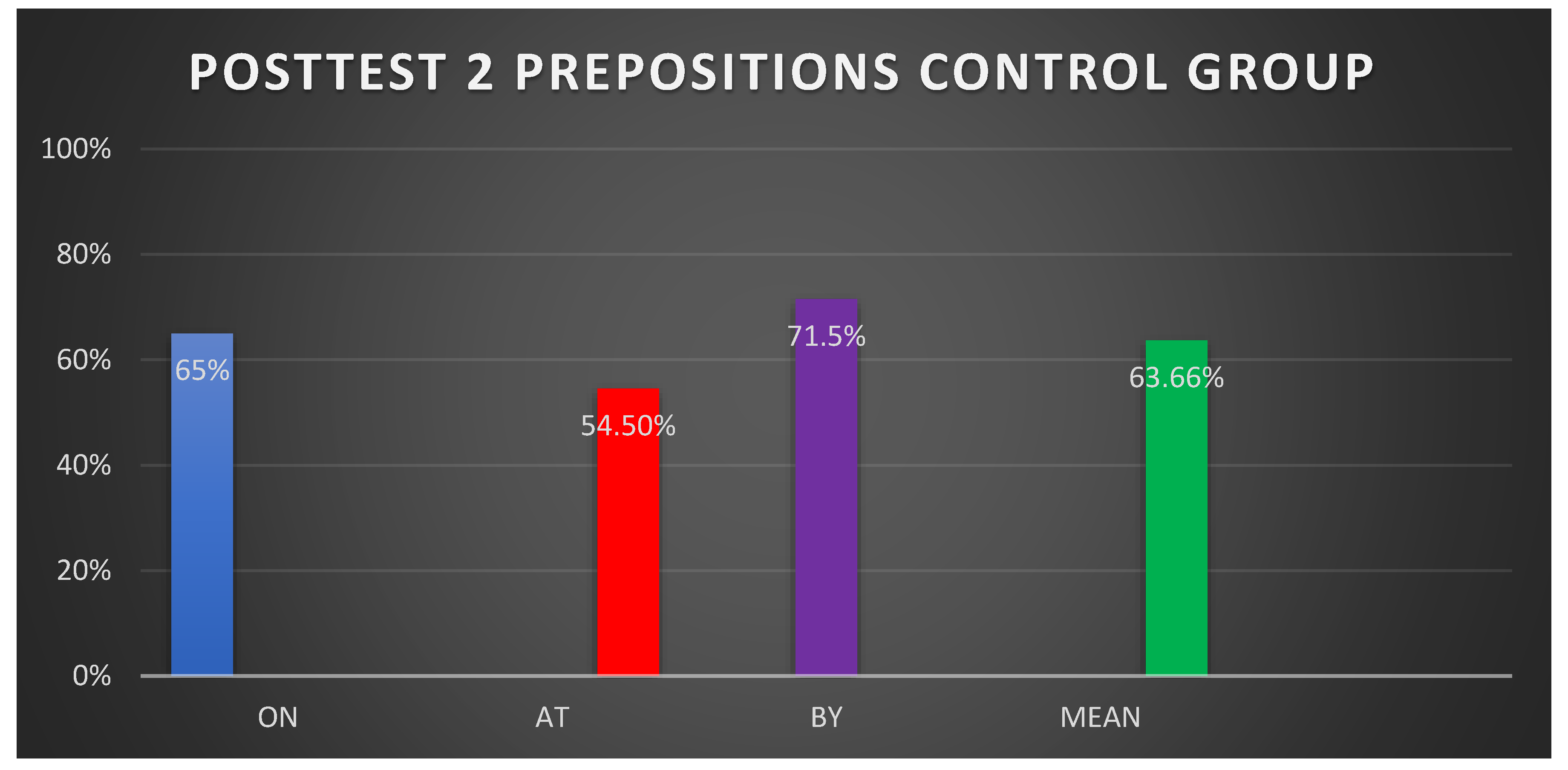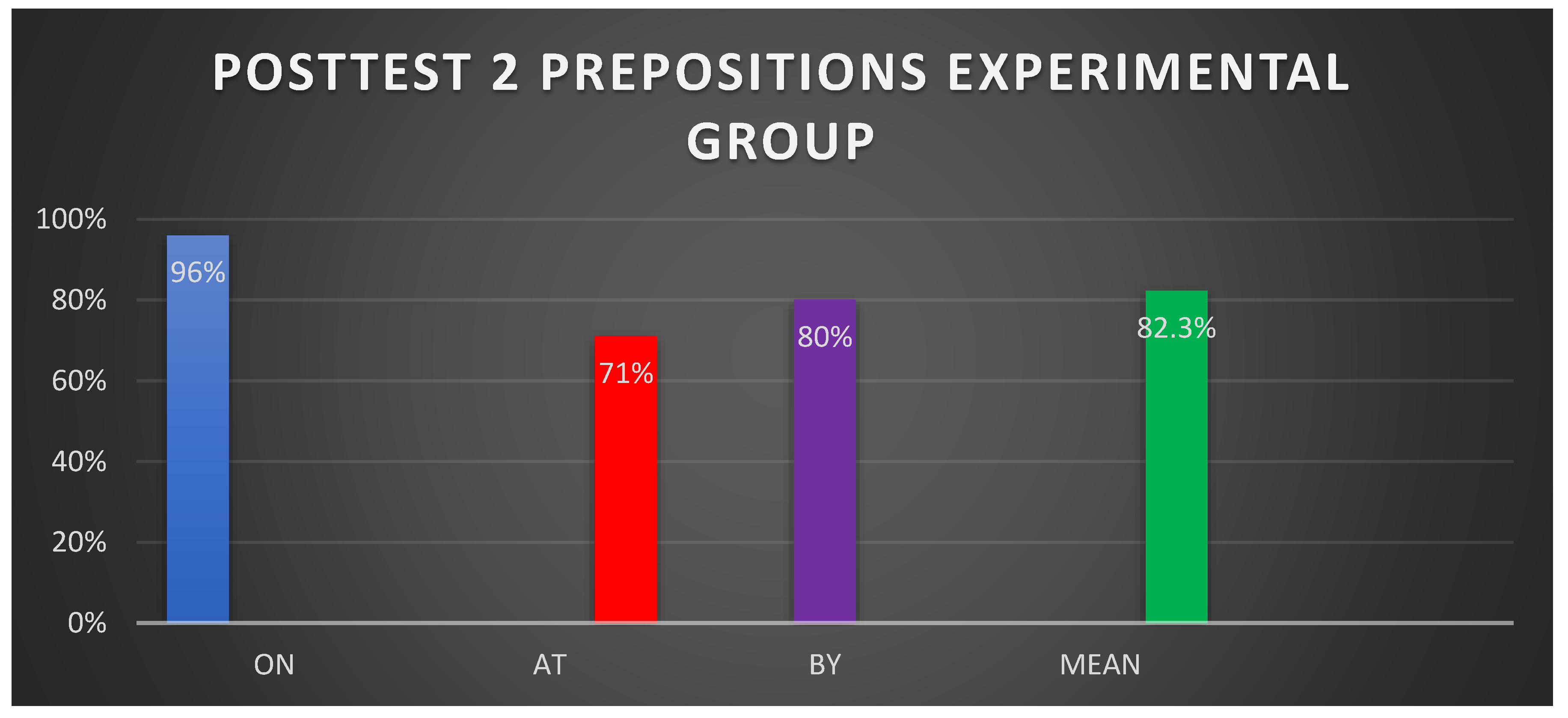The Interference of Arabic Prepositions in Emirati English
Abstract
:1. Introduction
- Are there influences of MSA (L2) and Emirati Dialect (L1) in the acquisitions of prepositions in English?
- Is there a meaningful difference in the result among the participants of the control group, who learn through music and the control group, whose participants learn through a traditional method (reading and repetition of the content)?
- Are there differences in the results obtained by the participants regarding their educational background and gender?
- Are the results similar to the ones obtained in our previous study [20], in which the content taught through dance (experimental groups 1 and 2, composed of ballet and flamenco dancers respectively) obtained a statistically meaningful difference compared to the control group (group of participants trained in a traditional way, by reading and repeating the content)?
2. Historical Overview
2.1. The Foundation Period: The Introduction of English (1809–1966)
2.2. The Exonormative Stabilization: English as the Language of Administration and Education (1966–2004)
2.3. The Nativization Period (2004 Until Present)
2.4. English as Lingua Franca
3. Theoretical Framework
3.1. A Contrastive Linguistic Analysis on the Arabic Prepositional System
- I am extremely sorry for your results.
- The email I got is full of mistakes.
- 3.
- رأيت ماريا في سيارتها. Raiatu Maria fi saiaratiha.
- 4.
- She left the party without saying anything.
- 5.
- I am not used to traveling so much.
- 6.
- Where is he from?
- 7.
- I have the results the director asked for.
- 8.
- She went home before she finished her task.
- 9.
- I haven’t met Dan since he returned from Tangier.
Studies on Prepositions in Emirati Dialect and Gulf English
- أكِل مِن المطعم. Akil min almat3m.
- انا في الدرب. Ana fi darb, I am in my way.
- تميت بالعزبة لين الفجر Tamit bial3izba liin alfajir.
- تميت بالعزبة حتى الفجر. Tamit biall3izba 7ata alfajir.
3.2. Multiple Intelligences: The Brain and Language
3.2.1. Musical Intelligence
3.2.2. Musical Intelligence and Autism
3.2.3. Musical Therapy
4. Participants
5. Method
6. Results and Discussion
- 10.
- 7 انتهي من العمل في (I finish work at 7)
- 11.
- من زمان وأنا أبا هالشي (I’ve been wanting this for a long time.)
- 12.
- اترييني. (wait for me)
6.1. Pretest
6.2. Posttest 1: Grammar (Prepositions)
6.3. Posttest 2: Grammar (Prepositions)
6.4. Descriptive Analysis
7. Conclusions
Funding
Informed Consent Statement
Data Availability Statement
Conflicts of Interest
Appendix A. Questionnaire to Select Participants to the Experiment and Control Group
Appendix B. Pretest and Posttests I and II (Arabic to English; Participants Had Neither the Translation nor the Colored Prepositions Shown Below. The Prepositions in Green Means that the Preposition Exists in only One of the Languages)
Appendix C. Pretest and Posttests I and II: Prepositions Part II
Appendix D. Preposition Training—Part 1 (Both Groups Were Explained How to Use the Following Prepositions and Each Session Started by Reading the List Below)
Appendix E. Preposition Training—Part 2 (Both Experimental and Control Groups Had the Following Text; However, the Experimental Group Sang Along as They Were Drilled)
References
- Gardner, H. Frames of Mind: The Theory of Multiple Intelligences; Basic Books: New York, NY, USA, 1983. [Google Scholar]
- Gardner, H. Multiple Intelligences: New Horizons–Completely Revised and Updated; Basic Books: New York, NY, USA, 2006. [Google Scholar]
- Campbell, L.; Campbell, D.; Dickinson, D. Teaching and Learning through the Multiple Intelligences, 2nd ed.; Allyn and Bacon: Boston, MA, USA, 1999. [Google Scholar]
- Alhebsi, A.; Pettaway, L.D.; Waller, L.R. A history of Education in the United Arab Emirates and Trucial Kingdoms. Glob. Elearning J. 2015, 4, 1–6, Ras-Al Khaima. [Google Scholar]
- Craig, E. Hou, Amusia in Encyclopedia of the Neurological Sciences; Academic Press: Cambridge, MA, USA, 2003; pp. 122–124. [Google Scholar]
- Ayotte, J.; Peretz, I.; Hyde, K. Congenital amusia: A group study of adults afflicted with a music-specific disorder. Brain 2002, 125, 238–251. [Google Scholar] [CrossRef] [PubMed]
- Straus, J. Idiot Savants, Retarded Savants, Talented Aments, Mono-Savants, Autistic Savants, just Plain Savants, People with Savant Syndrome, and Autistic People Who are Good at Things: A View from Disability Studies. Disabil. Stud. Q. 2014, 34. Available online: http://dsq-sds.org/article/view/3407/3640 (accessed on 13 November 2020). [CrossRef]
- Miller, L.K. Sensitivity to Tonal Structure in a Developmentally Disabled Musical Savant. Psychol. Music 1987, 15, 76–89. [Google Scholar] [CrossRef]
- Miller, L. Musical Savants: Exceptional Skill in the Mentally Retarded; Lawrence Erlbaum and Associates: Hillsdale, NJ, USA, 1989. [Google Scholar]
- Miller, L. Sensitivity to sequential structure in musical savants. Am. J. Ment. Retard. 1995, 99, 391–399. [Google Scholar] [PubMed]
- Miller, L. Defining the Savant Syndrome. J. Dev. Phys. Disabil. 1998, 10, 73–85. [Google Scholar] [CrossRef]
- Miller, L. The Savant Syndrome: Intellectual Impairment and Exceptional Skill. Psychol. Bull. 1999, 125, 31–46. [Google Scholar] [CrossRef]
- Brook, D. A History of Future Cities; W.W. Norton & Company, Inc.: New York, NY, USA, 2013. [Google Scholar]
- United Arab Emirates Demography and Statistics through a Magnifying Glass. Available online: https://tgmresearch.com/uae-population-and-demographics.html (accessed on 10 October 2020).
- United Arab Emirates Population Statistics 2020. Available online: https://www.globalmediainsight.com/blog/uae-population-statistics/ (accessed on 10 October 2020).
- Ribeiro Daquila, J.P. Promoting Arabic Literacy in Primary Schools in the United Arab Emirates through the Emirati Dialect. Sci 2020, 2, 93. [Google Scholar] [CrossRef]
- Saiegh-Haddad, E. Linguistic distance and initial reading acquisition: The case of Arabic diglossia. Appl. Psycholinguist. 2003, 24, 431–451. [Google Scholar] [CrossRef]
- Carroll, K.S.; Al Kahwaji, B.; Litz, D. Triglossia and promoting Arabic literacy in the United Arab Emirates. Lang. Cult. Curric. 2017, 30, 317–332. [Google Scholar] [CrossRef]
- Findlow, S. Higher education and linguistic dualism in the Arab Gulf. Br. J. Soc. Educ. 2006, 27, 19–36. [Google Scholar] [CrossRef]
- Ribeiro Daquila, J.P. A Framework of the Bilingual Secondary Schools in the Community of Madrid and a Perspective of Dance to Help Build Up Other Areas. Ph.D. Thesis, Universidad de Alcalá, Madrid, Spain, 2014. [Google Scholar]
- Schneider, E.W. Postcolonial English; Cambridge University Press: Cambridge, UK, 2007. [Google Scholar]
- Onley, J. Britain and the Gulf Shaikhdoms, 1820–1971: The Politics of Protection; Georgetown University: Doha, Qatar, 2009. [Google Scholar]
- Boyle, R. Language contact in the United Arab Emirates. World Engl. 2012, 31, 277–292. [Google Scholar] [CrossRef]
- Davidson, C.M. The emirates of Abu Dhabi and Dubai: Contrasting roles in the international system. Asian Aff. 2007, 38, 33–48. [Google Scholar] [CrossRef]
- Fox, J.; Mourtada-Sabbah, N.; Al-Mutawa, M. The Arab Gulf region: Traditionalism globalized, or globalization traditionalized? In Globalization and Gulf; Routledge: London, UK, 2006; pp. 3–59. [Google Scholar]
- Al-Khouri, A.M. The Challenge of Identity in a Changing World: The Case of Identity; University of Exeter: Devon, UK, 2010. [Google Scholar]
- Siemund, P.; Al-Issa, A.; Leimgruber, J.R.E. Multilingualism and the role of English in the United Arab Emirates. World Engl. 2020, 1–14. [Google Scholar] [CrossRef]
- Randall, M.; Samimi, M.A. The status of English in Dubai. Engl. Today 2010, 26, 43–50. [Google Scholar] [CrossRef]
- Al-Issa, A.; Dahan, L.S.; Dahan, L.S. Global English and endangered Arabic in the United Arab Emirates. In Global English and Arabic; Al-Issa, A., Dahan, L.S., Eds.; Peter Lang: Bern, Switzerland, 2011; pp. 1–22. [Google Scholar]
- Boyle, R. Patterns of change in English as a lingua franca in the UAE. Int. J. Appl. Linguist. 2011, 22, 143–161. [Google Scholar]
- Fussell, B. The local flavour of English in the Gulf. Engl. Today 2011, 27, 26–32. [Google Scholar] [CrossRef]
- Al-Marrani, Y. A Comparative and Contrastive Study of Preposition in Arabic and English. Lang. India 2009, 9, 46–68. [Google Scholar]
- Abbas, H.H. Some Remarks on the Prepositions (in), (on) and (to) in English and Standard Arabic. Al-Mustansiriya Lit. Rev. 1985, 11, 41–50. [Google Scholar]
- Abu Ghwaileh, F.M.R. The Effect of Arabic Proficiency on the L2 English Writing Skills of Emirati Grade Nine Male Students; The British University in Dubai: Dubai, United Arab Emirates, 2014. [Google Scholar]
- Jensen-Moulton, S. Finding Autism in the Composition of a 19th-Century Prodigy. In Sounding Off: Theorizing Disability in Music; Lerner, N., Straus, J.N., Eds.; Routledge: New York, NY, USA, 2006; pp. 199–216. [Google Scholar]
- Davis, J.; Baron, M.G. Blind Tom: A Celebrated Slave Pianist Coping with the Stress of Autism. In Stress and Coping in Autism; Baron, M.G., et al., Eds.; Oxford University Press: New York, NY, USA, 2006; pp. 96–126. [Google Scholar]
- O’Connell, D. The Ballad of Blind Tom; Overlook Press: New York, NY, USA, 2009. [Google Scholar]
- Southall, G.H. Blind Tom: The Post Civil-War Enslavement of a Black Musical Genius; Challenge Books: Minneapolis, MN, USA, 1979. [Google Scholar]
- Southall, G.H. The Continuing Enslavement of Blind Tom, the Black Pianist-Composer (1865–1887); Challenge Books: Minneapolis, MN, USA, 1983. [Google Scholar]
- Southall, G.H. Blind Tom, The Black Pianist Composer: Continually Enslaved; Scarecrow Press: Lanham, MD, USA, 1999. [Google Scholar]
- Moreira, S.V.; Justi, F.R.D.R.; Moreira, M. Can Musical Intervention Improve Memory in Alzheimer’s Patients? Evidence from a Systematic Review. Dement Neuropsychol. 2018, 12, 133–142. [Google Scholar] [CrossRef] [PubMed]
- Magee, W.L.; Clark, I.; Tamplin, J.; Bradt, J. Music interventions for acquired brain injury. Cochrane Database Syst. Rev. 2017, 1, CD006787. [Google Scholar] [CrossRef]
- Wouden, J.C.; Bruinsma, M.S.; Scholten, R.J.; Vink, A.C. Music-based therapeutic interventions for people with dementia. Cochrane Database Syst. Rev. 2018, 7, CD003477. [Google Scholar]
- Can Music Help Someone with Alzheimer’s? Available online: https://www.mayoclinic.org/diseases-conditions/alzheimers-disease/expert-answers/music-and-alzheimers/faq-20058173 (accessed on 16 November 2020).
- Música Para Despertar. Available online: https://www.musicaparadespertar.com/ (accessed on 16 November 2020).
- The Moment a Ballerina with Alzheimer’s Returned to Swan Lake. Available online: https://www.bbc.com/news/av/world-europe-54896710 (accessed on 16 November 2020).
- Viral Video of Ballerina with Alzheimer’s Shows Vital Role of Music in Memory. Available online: https://www.theguardian.com/stage/2020/nov/13/viral-video-of-ballerina-with-alzheimers-shows-vital-role-of-music-in-memory (accessed on 16 November 2020).
- Ghetti, M.C. Music therapy and music-based interventions for surgery, medical procedures and examinations. J. Med. Music Ther. 2014, 7, 1–10. [Google Scholar]
- Gökçek, E.; Kaydu, A. The Effects of Music Therapy in Patients Undergoing Septorhinoplasty Surgery under General Anesthesia. 2019. Available online: https://www.sciencedirect.com/science/article/pii/S1808869418306062 (accessed on 10 December 2020).
- Leighfield, J. Elephant Undergoes Music Therapy. 2020. Available online: https://www.euroweeklynews.com/2020/11/11/elephant-undergoes-music-therapy/ (accessed on 15 December 2020).
- Sinatra’s ‘My Way’ Prepares Pakistan’s only Asian Elephant for New Home. 2020. Available online: https://www.khaleejtimes.com/world/pakistan/sinatras-my-way-prepares-pakistans-only-asian-elephant-for-new-home (accessed on 8 March 2021).
- Wen, J.C.; Ismafairus, A.; Malin, A. Working Memory from the Psychological and Neurosciences Perspectives: A Review. J. Front. Psychol. 2018, 9, 401. [Google Scholar]
- Evans, B.G.; Iverson, P. Plasticity in vowel perception and production: A study of accent change in young adults. J. Acoust. Soc. Am. 2007, 121, 3814–3826. [Google Scholar] [CrossRef] [PubMed]
- Logan, J.S.; John, S.P. Methodological Issues in Training Listeners to Non-Native Phonemes. In Speech Perception and Linguistic Experience: Issues in Cross-Language Research; Winifred, S., Ed.; York Press: Baltimore, MD, USA, 1995; pp. 351–378. [Google Scholar]
- Moore-Jones, P.J. Linguistic Imposition: The Policies and Perils of English as a Medium of Instruction in the United Arab Emirates. J. ELT Appl. Linguist. 2015, 3, 63–73. [Google Scholar]
- Labov, W. Sociolinguistic Patterns; University of Pennsylvania Press: Philadelphia, PA, USA, 1972; pp. 1–355. [Google Scholar]
- Alahmadi, S.D. Insight into the attitudes of speakers of urban Meccan Hijazi Arabic towards their dialect. In Advances in Language and Literary Studies; Australian International Academic Centre: Footscray, Australia, 2016; Volume 7, pp. 249–256. [Google Scholar]
- Mohamad, A.A.; Salam Alnamer, S. The Use of Loanwords in Emirati Arabic According to Speakers’ Gender, Educational Level, and Age. Int. J. Appl. Linguist. Engl. Lit. 2018, 7, 158–176. [Google Scholar]










| Arabic | Transliteration | English |
|---|---|---|
| في | fi | in |
| إلى | ilā | to/towards |
| على | 3lā | on |
| من | min | from |
| ب | bi | in/with |
| لِ | li | for/to |
| Preposition on | on a Farm | on an Island | on Independence Day | on the Bus | on This List | on the Phone | في أول من ديسمبر (on the 1st of Dec.) | في التلفزيون on TV | في يوتيوب on You-Tube | عليهم خصم on Sale | Percentage of Correct Answers |
|---|---|---|---|---|---|---|---|---|---|---|---|
| Control group | 0 | 1 | 6 | 0 | 1 | 9 | 2 | 2 | 0 | 7 | X = 2800/200 = 14% |
| Experimental group | 0 | 0 | 4 | 0 | 0 | 10 | 3 | 2 | 0 | 6 | X = 2500/200 = 12.5% |
| Preposition in | in Different Colors | in Spring | in London | in the Morning | على شارع الخير in/on Khair St. | في أميركا in America | في الصورة (in the Picture) | في ديسمبر (in Dec.) | in the Car | in the Taxi | Percentage of Correct Answers |
|---|---|---|---|---|---|---|---|---|---|---|---|
| Control group | 18 | 20 | 20 | 20 | 20 | 20 | 17 | 20 | 20 | 20 | X = 19,500/200 = 97.5% |
| Experimental group | 19 | 20 | 20 | 20 | 20 | 20 | 18 | 20 | 20 | 20 | X= 19,700/200 = 98.5% |
| Preposition at | at Christmas | at 234 Oxford Street | at [email protected] | at the End of the Month | at the Weekend | at Night | 7 في at 7 | Laugh at | Yell at | Good at | % of Correct Answers |
|---|---|---|---|---|---|---|---|---|---|---|---|
| Control group | 3 | 0 | 9 | 2 | 4 | 7 | 20 | 3 | 2 | 0 | X = 5000/200 = 25% |
| Experimental group | 4 | 0 | 11 | 2 | 3 | 5 | 19 | 4 | 2 | 0 | X = 5000/200 = 25% |
| Preposition by | by Preparing for It | go by Metro | by Mistake | by Chance | by Credit Card | by Shakespeare | by My Side | by Myself | by 5 pm | by the Lake | % of Correct Answers |
|---|---|---|---|---|---|---|---|---|---|---|---|
| Control group | 0 | 11 | 13 | 15 | 6 | 13 | 12 | 13 | 4 | 2 | X = 8900/200 = 44.5% |
| Experimental group | 0 | 13 | 13 | 15 | 4 | 14 | 11 | 14 | 3 | 1 | X = 8800/200 = 44% |
| Total of Correct Answers | Gender: Male Total Number of Correct Answers | Gender: Female Total Number of Correct Answers | Level of Education: Secondary School | Level of Education: University or Master’s Degree |
|---|---|---|---|---|
| 330 | 134 | 196 | 71 | 259 |
| Preposition on | on a Farm | on an Island | on Independence Day | on the Bus | on This List | on the Phone | في أول من ديسمبر (on the 1st of Dec.) | في التلفزيون on TV | في يوتيوب on You-Tube | عليهم خصم on sale | % of Correct Answers |
|---|---|---|---|---|---|---|---|---|---|---|---|
| Control group | 8 | 9 | 11 | 9 | 8 | 14 | 12 | 11 | 9 | 13 | X = 10,400 /200 = 52% |
| Experimental group | 20 | 15 | 15 | 16 | 16 | 18 | 17 | 17 | 18 | 19 | X = 17,100 /200 = 85.5% |
| Preposition at | at Christmas | at 234 Oxford Street | at [email protected] | at the End of the Month | at the Weekend | at Night | 7 في at 7 | Laugh at | Yell at | Good at | % of Correct Answers |
|---|---|---|---|---|---|---|---|---|---|---|---|
| Control group | 4 | 6 | 14 | 6 | 11 | 8 | 20 | 6 | 6 | 6 | X = 8700/200 = 43.5% |
| Experimental group | 5 | 10 | 15 | 7 | 20 | 8 | 20 | 8 | 7 | 14 | X = 11,400/200 = 57% |
| Preposition by | by Preparing for It | Go by Metro | by Mistake | by Chance | by Credit Card | by Shakespeare | by My Side | by Myself | by 5 pm | by the Lake | % of Correct Answers |
|---|---|---|---|---|---|---|---|---|---|---|---|
| Control group | 8 | 13 | 15 | 17 | 7 | 15 | 13 | 15 | 6 | 6 | X = 11,500/200 = 57.5% |
| Experimental group | 7 | 14 | 15 | 17 | 7 | 16 | 14 | 15 | 6 | 16 | X = 12,700/200 = 63.5% |
| Total of Correct Answers | Gender: Male Total Number of Correct Answers | Gender: Female Total Number of Correct Answers | Level of Education: Secondary School | Level of Education: University or Master’s Degree |
|---|---|---|---|---|
| 718 | 306 | 412 | 293 | 425 |
| Preposition on | on A Farm | on An Island | on Independence Day | on the Bus | on This List | on the Phone | في أول من ديسمبر (on the 1st of Dec.) | في التلفزيون on TV | في يوتيوب on You-Tube | عليهم خصم on Sale | % of Correct Answers |
|---|---|---|---|---|---|---|---|---|---|---|---|
| Control group | 12 | 14 | 13 | 12 | 9 | 15 | 14 | 14 | 13 | 14 | X = 1,3000/200 = 65% |
| Experimental group | 20 | 20 | 16 | 20 | 19 | 20 | 18 | 19 | 20 | 20 | X = 1,9200/200 = 96% |
| Preposition at | at Christmas | at 234 Oxford Street | at [email protected] | at the End of the Month | at the Weekend | at Night | 7 في at 7 | Laugh at | Yell at | Good at | % of Correct Answers |
|---|---|---|---|---|---|---|---|---|---|---|---|
| Control group | 8 | 9 | 16 | 9 | 13 | 9 | 20 | 9 | 8 | 8 | X = 10,900/200 =54.5% |
| Experimental group | 8 | 19 | 17 | 9 | 20 | 9 | 20 | 11 | 9 | 20 | X =14,200/200 = 71% |
| Preposition by | by Preparing for It | Go by Metro | by Mistake | by Chance | by Credit Card | by Shakespeare | by My Side | by Myself | by 5 pm | by the Lake | % of Correct Answers |
|---|---|---|---|---|---|---|---|---|---|---|---|
| Control group | 12 | 16 | 17 | 18 | 11 | 17 | 16 | 17 | 9 | 10 | X = 14,300/200 = 71.5% |
| Experimental group | 13 | 16 | 18 | 19 | 12 | 17 | 17 | 18 | 10 | 20 | X = 16,000/200 = 80% |
| Total of Correct Answers | Gender: Male Total Number of Correct Answers | Gender: Female Total Number of Correct Answers | Level of Education: Secondary School | Level of Education: University or Master’s Degree |
|---|---|---|---|---|
| 876 | 407 | 469 | 414 | 462 |
| Control | Experimental | |||||||
|---|---|---|---|---|---|---|---|---|
| Mean | SD | Median | Mean | SD | Median | z | p-Value | |
| Differences pre–posttest 2 | 10.750 | 1.070 | 11 | 16.450 | 0.759 | 17 | −5.531 | <0.001 |
Publisher’s Note: MDPI stays neutral with regard to jurisdictional claims in published maps and institutional affiliations. |
© 2021 by the author. Licensee MDPI, Basel, Switzerland. This article is an open access article distributed under the terms and conditions of the Creative Commons Attribution (CC BY) license (https://creativecommons.org/licenses/by/4.0/).
Share and Cite
Ribeiro Daquila, J.P. The Interference of Arabic Prepositions in Emirati English. Sci 2021, 3, 19. https://doi.org/10.3390/sci3020019
Ribeiro Daquila JP. The Interference of Arabic Prepositions in Emirati English. Sci. 2021; 3(2):19. https://doi.org/10.3390/sci3020019
Chicago/Turabian StyleRibeiro Daquila, Jean Pierre. 2021. "The Interference of Arabic Prepositions in Emirati English" Sci 3, no. 2: 19. https://doi.org/10.3390/sci3020019
APA StyleRibeiro Daquila, J. P. (2021). The Interference of Arabic Prepositions in Emirati English. Sci, 3(2), 19. https://doi.org/10.3390/sci3020019






